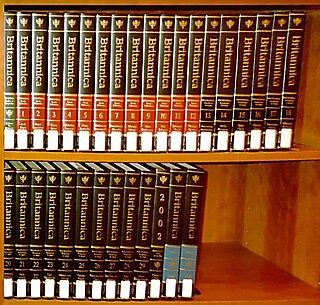
An encyclopedia, encyclopædia, or encyclopaedia is a reference work or compendium providing summaries of knowledge either from all branches or from a particular field or discipline. Encyclopedias are divided into articles or entries that are often arranged alphabetically by article name and sometimes by thematic categories. Encyclopedia entries are longer and more detailed than those in most dictionaries. Generally speaking, encyclopedia articles focus on factual information concerning the subject named in the article's title; this is unlike dictionary entries, which focus on linguistic information about words, such as their etymology, meaning, pronunciation, use, and grammatical forms.
Lexicography is the study of lexicons, and is divided into two separate but equally important academic disciplines:
Speech synthesis is the artificial production of human speech. A computer system used for this purpose is called a speech computer or speech synthesizer, and can be implemented in software or hardware products. A text-to-speech (TTS) system converts normal language text into speech; other systems render symbolic linguistic representations like phonetic transcriptions into speech.
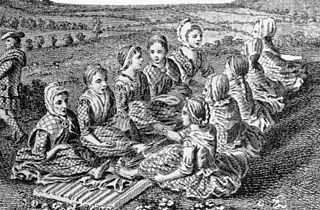
Fulling, also known as tucking or walking, is a step in woollen clothmaking which involves the cleansing of cloth to eliminate oils, dirt, and other impurities, and to make it thicker. The practice died out with the modernisation of the industrial revolution.
A passphrase is a sequence of words or other text used to control access to a computer system, program or data. It is similar to a password in usage, but a passphrase is generally longer for added security. Passphrases are often used to control both access to, and the operation of, cryptographic programs and systems, especially those that derive an encryption key from a passphrase. The origin of the term is by analogy with password. The modern concept of passphrases is believed to have been invented by Sigmund N. Porter in 1982.
In human–computer interaction and user interface design, cut, copy, and paste are related commands that offer an interprocess communication technique for transferring data through a computer's user interface. The cut command removes the selected data from its original position, while the copy command creates a duplicate; in both cases the selected data is kept in temporary storage. The data from the clipboard is later inserted wherever a paste command is issued. The data remains available to any application supporting the feature, thus allowing easy data transfer between applications.

The Dictionary of National Biography (DNB) is a standard work of reference on notable figures from British history, published since 1885. The updated Oxford Dictionary of National Biography (ODNB) was published on 23 September 2004 in 60 volumes and online, with 50,113 biographical articles covering 54,922 lives.

Jay Wright Forrester was a pioneering American computer engineer and systems scientist. He is credited with being one of the inventors of magnetic core memory, the predominant form of random-access computer memory during the most explosive years of digital computer development. It was part of a family of related technologies which bridged the gap between vacuum tubes and semiconductors by exploiting the magnetic properties of materials to perform switching and amplification.

Sarah Margaret Fuller Ossoli was an American journalist, editor, critic, translator, and women's rights advocate associated with the American transcendentalism movement. She was the first American female war correspondent, writing for Horace Greeley's New-York Tribune, and full-time book reviewer in journalism. Her book Woman in the Nineteenth Century is considered the first major feminist work in the United States.

Lawrence Gordon Tesler was an American computer scientist who worked in the field of human–computer interaction. Tesler worked at Xerox PARC, Apple, Amazon, and Yahoo!
Cut & Paste is a word processor published in 1984 for the Apple II, Atari 8-bit family, Commodore 64, IBM PC, and IBM PCjr. The few productivity releases from game developer and publisher Electronic Arts include this and Financial Cookbook. In the UK it was distributed by Ariolasoft.
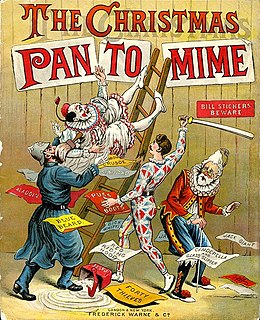
Pantomime is a type of musical comedy stage production designed for family entertainment. It was developed in England and is performed throughout the United Kingdom, Ireland and in other English-speaking countries, especially during the Christmas and New Year season. Modern pantomime includes songs, gags, slapstick comedy and dancing. It employs gender-crossing actors and combines topical humour with a story more or less based on a well-known fairy tale, fable or folk tale. Pantomime is a participatory form of theatre, in which the audience is encouraged and expected to sing along with certain parts of the music and shout out phrases to the performers.
Edward Joseph Flynn was an American lawyer and politician. Flynn was a leading Democratic politician of the mid-twentieth-century, known for his tight control of the Bronx Democratic Party organization after 1922.
The clipboard is a buffer that some operating systems provide for short-term storage and transfer within and between application programs. The clipboard is usually temporary and unnamed, and its contents reside in the computer's RAM.
Joseph Jay Deiss (1912–1999), an American author, businessman, historian and archaeologist, was born in Twin Falls, Idaho and graduated from the University of Texas, where he also received his Masters.
PowerWord is a collection of Chinese, English and bilingual dictionaries and supporting proprietary software, published on CD-ROM in China by Kingsoft. Originally produced for the Microsoft Windows platform, it is now available for Mac OS X, iPhone, Java for Nokia smartphones, and is available online. The CD-ROM often prominently carries the label "CIBA" as well as Chinese characters.

John Alexander Fuller Maitland was an influential British music critic and scholar from the 1880s to the 1920s. He encouraged the rediscovery of English music of the 16th and 17th centuries, particularly Henry Purcell's music and English virginal music. He also propounded the notion of an English Musical Renaissance in the second half of the 19th century, particularly praising Charles Villiers Stanford and Hubert Parry.
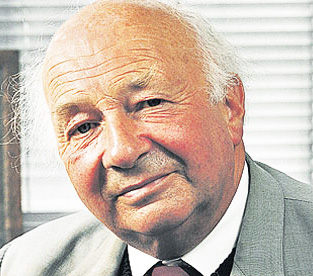
John Barry Steane was an English music critic, musicologist, literary scholar and teacher, with a particular interest in singing and the human voice. His 36-year career as a schoolmaster overlapped with his career as a music critic and author of books on Elizabethan drama, and opera and concert singers.
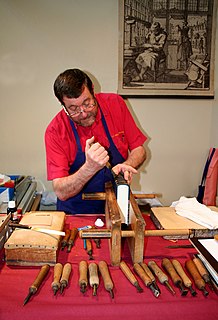
Bookbinding is the process of physically assembling a book of codex format from an ordered stack of paper sheets that are folded together into sections called signatures or sometimes left as a stack of individual sheets. Several signatures are then bound together along one edge with a thick needle and sturdy thread. Alternative methods of binding that are cheaper but less permanent include loose-leaf rings, individual screw posts or binding posts, twin loop spine coils, plastic spiral coils, and plastic spine combs. For protection, the bound stack is either wrapped in a flexible cover or attached to stiff boards. Finally, an attractive cover is adhered to the boards, including identifying information and decoration. Book artists or specialists in book decoration can also greatly enhance a book's content by creating book-like objects with artistic merit of exceptional quality.
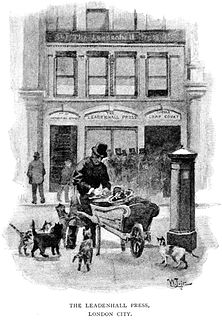
The Leadenhall Press was founded by Andrew White Tuer (1838–1900) as the publishing division of the London partnership of Field & Tuer, following a move to 50 Leadenhall Street in 1868. The firm began as job printers, stationers, and manufacturers in 1862, when Tuer joined with Abraham Field (1830–1891), an established producer of registers and log books. Among their early successes was the invention by Tuer of Stickphast Paste, a clean, vegetable-based product that quickly became the standard office paste.










